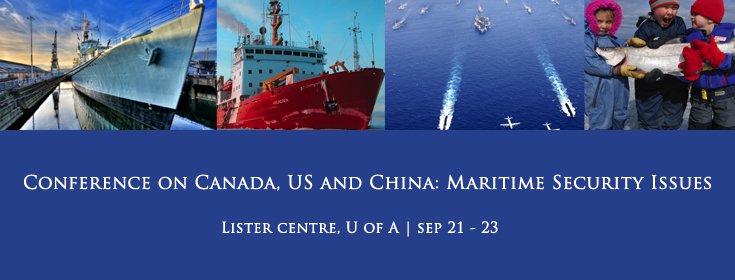Canada, US and China Relations
Canada, US and China Relations in Maritime Security
The Arctic and the South China Sea-Sharpened Competition or Collaboration?
September 22-23, 2011 University of AlbertaEdmonton, Alberta, Canada
Organized by
China Institute, University of Alberta
American Institute of Alberta, University of Alberta
Canadian Circumpolar Institute, University of Alberta
Both the Arctic and the South China Sea (SCS) has for decades received attention of the international community for various factors, geopolitics, strategic and security considerations, resource competition as well as multiple sovereignty and maritime claims. The prospect of the disappearance of Arctic sea ice and recent developments in the South China Sea in 2010 raise the risk of new rounds of competition, and inject uncertain elements to the security of both regions.
Arctic The shrinking Arctic sea ice raises serious sovereignty and security issues evolving relationships between the circumpolar states - Canada, US, Norway, Denmark, Iceland, Russia, Finland, Sweden, along with non-Arctic actors, such as European Union, China, Japan and South Korea. The interrelations among the Arctic States involve sovereignty disputes, jurisdiction claims, resource competition and military capacity expansion, while new non-Arctic interests in Arctic draw in elements of international shipping, seabed resources exploitation, environmental concern and scientific research. Non-Arctic actors' Arctic policy play no less important roles in articulating a governance framework for Arctic region, compared with that of traditional Arctic states. Like its East Asia neighbours, China sees the melting Arctic Ocean a unique opportunity for itself and international trade generally. The Arctic states, including Canada and US, are wary of China's position on Arctic and are questioning China's increased interest in those waters.
The SCS dispute is regarded as the most complex and challenging ocean-related regional conflict in East Asia. 2010 witnessed the escalation of the controversy in the SCS, with US's increasing presence in this region, and with a series of US-Sino spats on the SCS dispute. In March, as first reported by Japanese media and then by US media, Chinese officials told two visiting senior Obama administration officials that China would not tolerate any interference in the South China Sea, now part of China's "core interest" of sovereignty. In July, US Secretary of State Hillary Clinton made a statement at the 10th ASEAN regional forum (ARF) that the disputes over the highly sensitive South China Sea were a "leading diplomatic priority" and now "pivotal to regional security". These comments contributed to increasing concerns in Beijing who sees the US Secretary of States's statement as a signal that US will alert its "neutral position" on the SCS dispute. China and the United States point at each other, accusing the other party for changing their position on the South China Sea issues.
Given that developments, the workshop is timely, and will address the nexus of trilateral relations in maritime security in these two regions. In the South China Sea, China is a major claimant state, while the US asserts its own national interest in the South China Sea. In the Arctic, US and Canada differ in their interpretation of the legal status of the Northwest Passage. China's shown interest in the Arctic also raises some concern in Canada about which positions China will eventually pursue in the Arctic.
This day and a half workshop will bring scholars, government officials and representatives of energy, transportation and environment sectors from Canada, the US and China to discuss three dimensions of maritime security in both the Arctic and the South China Sea, namely 1) geopolitics and security, 2) international shipping, 3)Prospects and Challenges for Cooperation.
